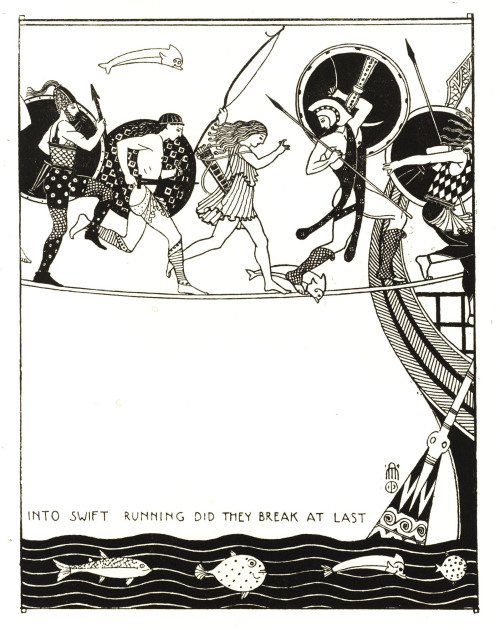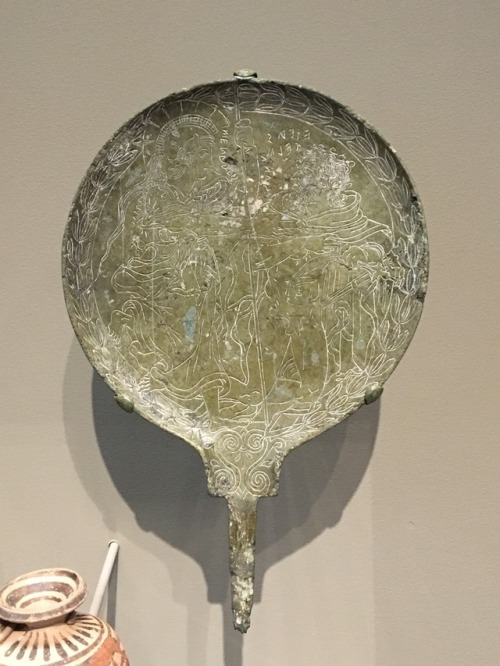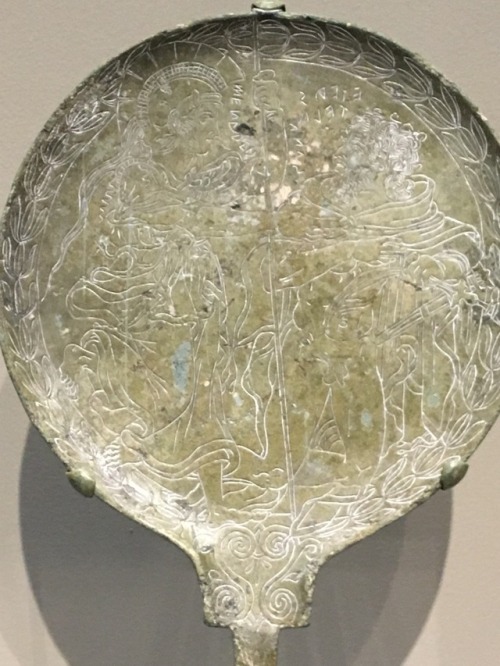Thinking About Heroes Wishing To Switch Places........
thinking about heroes wishing to switch places........
[...] when Odysseus meets the shade of Achilles, he addresses Achilles as "best of the Achaeans". But the Odyssey then has Achilles saying that he would rather be alive and the lowliest of serfs than to be dead and the kingliest of shades. [...] Achilles seems ready to trade places with Odysseus, whose safe homecoming will be marked by a painful transitional phase at the very lowest levels of the social order. The words of Achilles in the first nekuia are ironically conjuring up the glorious days of the Iliad when he had said: "I have lost a safe return home [nostos], but I will have unfailing glory [kleos]." (IX 413) The destiny of the Odyssey is that Odysseus shall have a nostos, 'safe return home'. From the retrospective vantage point of the Odyssey, Achilles would trade his kleos for a nostos. It is as if he now would trade an Iliad for an Odyssey. By contrast, at a moment when Odysseus is sure that he will perish in the stormy sea, he wishes that he had died at Troy: "...and then the Achaeans would have carried on my kleos." (v 308-311)
From Gregory Nagy's The Best of the Achaeans: Concepts of the hero in ancient Greek poetry (1979)
More Posts from Phaespxria and Others

the princess and the dragon of colchis
I've been SO crazy about Medea lately. colchian dragon design is based on THIS kylix where it eats Jason <3
I Can’t Help But Wonder
Odysseus, who just violently and mercilessly murdered 108 or so men, who claims in the next song that he’s no longer a kind or gentle man, actively listens to Telemachus and kindly and gently responds to everything his son’s expressed.
Telemachus asks, “Am I like you? Am I strong like you? Will you embrace me? Will you love and accept me as yours?” He says, “I’ve felt so alone.”
And Odysseus claims him in a heartbeat, answering, “My son. My boy. My sweetest joy I’ve ever known. I embraced you twenty years ago. I’d do the impossible for you. I’d die for you.” He says, “Seeing the men here today, I can only wonder what you’ve been through for twenty years. My son, you’re already strong. You’re my own. You’re not alone. I’m home.”
And then they fucking embrace.


homophrosyne
Do you have any article related to the odyssey you'd reccommend as complementary to the source?
sorry i've been sitting on your ask for so long! i am not and never have been a classics student; i came across most of these articles incidentally or here on tumblr:
"the odysseys within the odyssey" by italo calvino
"a note on memory and reciprocity in homer's odyssey" by anita nikkanen
"penelope and the poetics of remembering" by melissa mueller
"a glossary of haunting" by eve tuck and c. ree (this is mostly about horror fiction and settler-colonialism but it has a gloss on the cyclops that i think everyone, certainly everyone american, should read)
silence in the land of logos by silvia montiglio chapter 8: "silence, ruse, and endurance: odysseus and beyond"
"the name of odysseus" by g.e. dimock, jr.
also ok it's very much not "good" but there's an article by w.b. stanford called "personal relationships" that just lists all his hot takes about the relationships in the odyssey for 25 pages. it reads just like scrolling the blog of a mutual twice removed. they let men publish ANYTHING in the 60s. i love this essay. i would read this essay out loud over discord right now if someone asked me.










Staff Pick of the Week
My staff pick is The Life and Death of Jason, a Metrical Romance by William Morris with decorations by Maxwell Armfield. This edition was published by Dodd, Mead and Company in New York in 1917.
William Morris was born on March 24, 1834 in Walthamstow, near London, England. He was known for being a being a leader in the Arts & Crafts movement, a socialist activist, and for founding the Kelmscott Press in 1891 which helped kick start the contemporary fine-press movement. Morris was also a poet and author, and his poem The Life and Death of Jason was first published in 1867. It chronicles the exploits of the Greek mythological hero Jason, leader of the Argonauts, and his quest for the Golden Fleece. Morris was a follower of the Pre-Raphaelite Brotherhood, and worked closely with the artist Edward Burne-Jones who illustrated several Kelmscott Press books, including the 1895 edition of The Life and Death of Jason.
I chose this 1917 edition of The Life and Death of Jason, printed 21 years after the death of William Morris in 1896, because of Maxwell Armfield’s wonderful illustrations. Maxwell Armfield was a British artist and writer who was trained in Arts and Crafts principles. I first came across Armfield’s Jason early in my time at Special Collections when I worked as undergraduate assistant shelving books in the department. Now several years later and much wiser about William Morris’s lasting legacy, I really see the connection of this book has with earlier editions even though it is aesthetically very different. This is made clear in Maxwell Armfield’s “Note on the Drawings” which precedes the text:
“In the case of an epic, one feels, I think, that the important quality of the décor should be unity not so much with the ideas of the text as with the book as book, and unity also within itself.
This point of view must consider the embellishment not so much as illustration proceeding from the text as a continuation of the binding and page purposing to present the text to the eye; or as commentary on certain aspects of the matter not necessarily touched on at all by the author.”
This holistic approach to book design is very much in line with Morris’s principles, even if the illustrations are more modern in appearance than the Kelmscott Press’s medievalist aesthetic.
For an even deeper dive into Maxwell Armfield’s artistic interpretation of The Life and Death of Jason, I recommend the article: Illustrating Morris:The Work of ]essie King and Maxwell Armfield by Rosie Miles published for the Journal of William Morris Studies in 2004.
View more posts about William Morris.
–Sarah, Special Collections Graduate Intern
just. john the apostle. john the beloved. john the youngest. john who rests his head on jesus' shoulders while he speaks. john who stayed with the women during the passion & wasnt ashamed of sharing their pain. john who got to the empty tomb before anyone else. john the patron saint of love & friendship & loyalty & writers & poets. my good friend john







Seven more 💍✨ That's a Witch-king of Angmar as seen by Frodo on the Weathertop!
Also, I’ve decided I'll be selling the originals after I finish all the drawings (that means after Easter). But if there is any character you'd like to have in particular you can start reserving them now. By messaging me here or on s.u.w.i@email.cz :^)
Warg is still available!
The prices are from 50 to 80USD (shipping included). And same as last year with the dog drawings this year also all the earnings will be sent to charities. Thank you! 🌿
Rest of the characters are here and here and here!

So how 'bout those trailers. OMG.
Speaking of how Troy 2004 has personally offended me:
They took sandpaper and went to town on Hector. Smoothed out all his imperfections because how can good man also be bad man sometimes oh no my brain can't deal with that.
Also they didn't make him nearly as scary as he should be. Hector in the iliad is the. Scariest. The achaeans are terrified of him. Like he's the guy that walks on the battlefield and people run for their lives. He can lift boulders. He gets his ribcage smashed and gets back up like ten minutes later (granted, that's apollo, but in the god-less universe of troy they could've used it to make him even scarier) He doesn't go home all clean, he goes home and talks to his wife and holds his son while covered in gore. It's stressed that nobody but Achilles can beat him. He nearly burns the ships. He boasts and commits hybris after killing Patroclus.
Hector is the unbeatable war machine that makes mistakes sometimes, that morphs into a loving, smiling dad when he sees his son. The unbeatable war machine that's keeping an entire city safe, that gets scared and runs for his life when he knows he's in actual danger. That in the second-to-final moment has to be tricked into bravery, to stand and fight, so he has the chance at the final moment to recover from that and be supremely brave again and run straight to death, with his mind set on glory. Because he's extremely human right to the end. And his pride is as huge as his feeling of duty and love.
Also they took away that great scene where he's like "fuck your bird signs" he was such a legend for that in the iliad.


This Etruscan mirror of Athena and Ajax is amazing because it’s a uniquely Etruscan conception of the myth where Athena literally urges Ajax to commit suicide rather than simply driving him mad. Today I got to see it in person at the Boston Museum Of Fine Art!
-
 ratboywinter liked this · 2 weeks ago
ratboywinter liked this · 2 weeks ago -
 loveoffthefloor liked this · 4 weeks ago
loveoffthefloor liked this · 4 weeks ago -
 nell37 liked this · 1 month ago
nell37 liked this · 1 month ago -
 ticinhas liked this · 1 month ago
ticinhas liked this · 1 month ago -
 0ncem0rew1thfeel1ng reblogged this · 1 month ago
0ncem0rew1thfeel1ng reblogged this · 1 month ago -
 tahiriveilasolo liked this · 1 month ago
tahiriveilasolo liked this · 1 month ago -
 sirjo-esque reblogged this · 2 months ago
sirjo-esque reblogged this · 2 months ago -
 sirjo-esque liked this · 2 months ago
sirjo-esque liked this · 2 months ago -
 kepler45ad liked this · 2 months ago
kepler45ad liked this · 2 months ago -
 m1nzyzul1c liked this · 2 months ago
m1nzyzul1c liked this · 2 months ago -
 di-iche liked this · 2 months ago
di-iche liked this · 2 months ago -
 lostintranslaation reblogged this · 2 months ago
lostintranslaation reblogged this · 2 months ago -
 lostintranslaation liked this · 2 months ago
lostintranslaation liked this · 2 months ago -
 arionaut reblogged this · 2 months ago
arionaut reblogged this · 2 months ago -
 arionaut liked this · 2 months ago
arionaut liked this · 2 months ago -
 the-supernatural-atheist liked this · 2 months ago
the-supernatural-atheist liked this · 2 months ago -
 thebutterfreeeffect liked this · 2 months ago
thebutterfreeeffect liked this · 2 months ago -
 nn-sinthe liked this · 2 months ago
nn-sinthe liked this · 2 months ago -
 mayonaisie liked this · 2 months ago
mayonaisie liked this · 2 months ago -
 delightfulcreativebluebird liked this · 2 months ago
delightfulcreativebluebird liked this · 2 months ago -
 ramblingsofinsanity reblogged this · 2 months ago
ramblingsofinsanity reblogged this · 2 months ago -
 lisztoaf liked this · 2 months ago
lisztoaf liked this · 2 months ago -
 misspines liked this · 2 months ago
misspines liked this · 2 months ago -
 ottatomayyyy liked this · 2 months ago
ottatomayyyy liked this · 2 months ago -
 nifty-yellow-pooch reblogged this · 2 months ago
nifty-yellow-pooch reblogged this · 2 months ago -
 theatremamadionysus reblogged this · 2 months ago
theatremamadionysus reblogged this · 2 months ago -
 eurydice-khthonios reblogged this · 2 months ago
eurydice-khthonios reblogged this · 2 months ago -
 eurydice-khthonios liked this · 2 months ago
eurydice-khthonios liked this · 2 months ago -
 iicherrl liked this · 2 months ago
iicherrl liked this · 2 months ago -
 beepboprobotsnot liked this · 2 months ago
beepboprobotsnot liked this · 2 months ago -
 churlsgrace liked this · 2 months ago
churlsgrace liked this · 2 months ago -
 theknittingoracle liked this · 2 months ago
theknittingoracle liked this · 2 months ago -
 brenyi liked this · 2 months ago
brenyi liked this · 2 months ago -
 snapdragxnn reblogged this · 2 months ago
snapdragxnn reblogged this · 2 months ago -
 snapdragxnn liked this · 2 months ago
snapdragxnn liked this · 2 months ago -
 yourgivingtree liked this · 2 months ago
yourgivingtree liked this · 2 months ago -
 shira-wa liked this · 2 months ago
shira-wa liked this · 2 months ago -
 sugarskunkcrusade reblogged this · 3 months ago
sugarskunkcrusade reblogged this · 3 months ago -
 sugarskunkcrusade liked this · 3 months ago
sugarskunkcrusade liked this · 3 months ago -
 idreamofstark reblogged this · 3 months ago
idreamofstark reblogged this · 3 months ago -
 jammahanna liked this · 3 months ago
jammahanna liked this · 3 months ago -
 traggalicious liked this · 3 months ago
traggalicious liked this · 3 months ago -
 theboookofkells reblogged this · 3 months ago
theboookofkells reblogged this · 3 months ago -
 kalty3 liked this · 3 months ago
kalty3 liked this · 3 months ago -
 syntherial liked this · 3 months ago
syntherial liked this · 3 months ago -
 troystory-enthusiast liked this · 3 months ago
troystory-enthusiast liked this · 3 months ago -
 starsigna reblogged this · 3 months ago
starsigna reblogged this · 3 months ago -
 starsigna liked this · 3 months ago
starsigna liked this · 3 months ago -
 and-the-flame-burns liked this · 3 months ago
and-the-flame-burns liked this · 3 months ago -
 zidlersrazor liked this · 3 months ago
zidlersrazor liked this · 3 months ago
